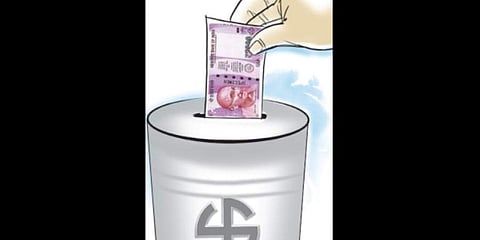

BENGALURU: With only a few days to go for the bypolls to 15 Assembly constituencies in Karnataka, campaigning has reached its crescendo with leaders of Congress, Janata Dal (Secular) and the ruling BJP sweating it out to win as many seats.
While the run up to the December 5 bypolls has all been about the turncoats and the survival of the BS Yediyurappa government, a fact that has emerged as a talking point is the money spent on conducting these elections.
According to the Election Commission of India (ECI) data, Rs 393 crore of taxpayers’ money was spent to hold the 2018 Assembly elections in the State. Barely a year-and-a-half later, bypolls are being held for 15 seats after prolonged political bickering that led to the disqualification of MLAs. And guess what? Yet again, an average of Rs 26.32 crore is being spent on these 15 seats where the ‘rebel’ MLAs are also contesting.
Ever since the conclusion of the 2018 Assembly elections, Karnataka has seen three governments, one parliamentary election, one bypoll and is now gearing up to vote in another. The financial burden on the exchequer is huge, but that is only the tip of the iceberg. Political analysts, perhaps much like common citizens, wonder if the public should bear the brunt of bypolls forced upon the electorate.
“Bypolls are not in themselves a waste of public money. However, the manner in which these bypolls were forced into existence through horse-trading means they were unwarranted. Since these bypolls are a direct result of questionable actions by certain candidates, those candidate — or the parties backing them — and not taxpayers should be required to bear all expenses,” pointed out Dr Harish Ramaswamy, political analyst and professor of Political Science at Karnatak University.
According to its submission before the ECI, the BJP spent Rs 122,68,97,742 (Rs 122 crore) and the Congress Rs 34,48,80,318 (Rs 34 crore) in the 2018 Assembly polls. The figure for JDS was not available with the ECI.
Money spent
On an average, the BJP spent Rs 54 lakh on each of the 224 constituencies, while the Congress shelled out Rs 15 lakh. These numbers are independent of how much candidates personally spent in their respective constituencies.
Government of India’s notification dated February 28, 2014,states that the revised ceiling of expenditure per candidate for Assembly elections in Karnataka is Rs 28 lakh.
In the ECI data, candidates have submitted expenditure records well below the maximum limit. But all of these numbers are only on paper. The ground reality speaks otherwise. Political parties categorise constituencies and set rates for each vote. Depending on the complexity of the poll battle, bribes in the form of cash or other means are distributed to voters. For instance, Rs 93 crore in cash, 5,40,762.89 litres of liquor and other items worth Rs 66.48 crore were seized by the ECI during the 2018 Assembly elections.
The size of seizures pale in comparison to the money that political parties spend. Among the disqualified MLAs, A H Vishwanath — who was elected from Hunsur — spent the most at Rs 20,83,108, followed by Rajarajeshwarinagar’s Muniratna with Rs 20,75,847, at least in the ECI records.
“Per vote rate of bypolls is more expensive. Voters are paid anywhere between Rs 200 and Rs 500 per vote in General Elections ... while bribes can go from Rs 500 to Rs 5,000 in an Assembly election depending on the seat,” said a senior leader of a national party who is currently driving its campaign in Karnataka.
The numbers are unbelievable. Despite large seizures that the Election Commission shows, monitoring poll expenditure is still a challenge.
“Election Commission can improve it by requiring that expenses of any kind related to candidates are digital, transparent and verifiable to the last penny. All cash transactions should be barred. Also, voter corruption should attract severe punishment, both through fines and imprisonment, for the voter and the politicians/political affiliates involved,” Dr Ramaswamy added.
Cash, clothes, liquor, food, gold, silver even promise of eligibility to government schemes, nothing is off the election bribe table.
Even when only 15 Assembly constituencies are going to polls, the cost of this bypoll — that was forced on people owing to rebellion within parties — is going to burn a hole in the pocket of every single taxpayer in the State.